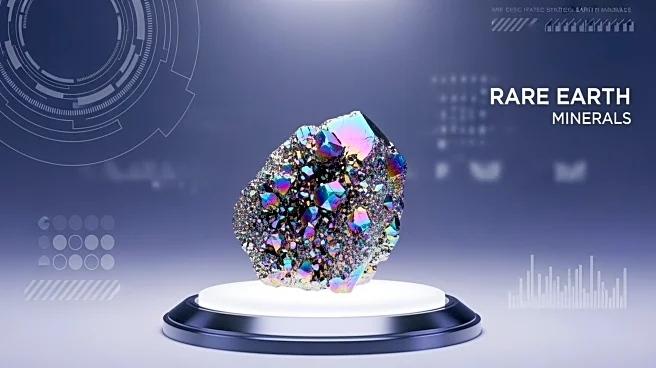What's Happening?
China has recently announced export controls on rare earth minerals, which are crucial for global trade and the manufacturing of key sectors, including computer chips. This move has placed the European
Union (EU) in a challenging position due to its reliance on Chinese exports. In response, the European Commission is reportedly considering measures to counteract China's controls, although specific plans have not been disclosed. The European Council on Foreign Relations (ECFR), a think-tank, has suggested potential countermeasures, including limiting China's access to Deep Ultraviolet (DUV) lithography machines, which are essential for chip manufacturing. These machines are primarily supplied by the Dutch company ASML, which collaborates with various European and international suppliers.
Why It's Important?
The imposition of export controls by China on rare earth minerals could significantly impact global industries reliant on these materials, particularly in the technology and manufacturing sectors. The EU's potential countermeasures, such as restricting access to DUV machines, could further strain international trade relations. This situation underscores the geopolitical tensions surrounding technological self-sufficiency and the strategic importance of rare earth minerals. The outcome of these developments could influence the global supply chain, affecting industries and economies worldwide. Stakeholders in the technology sector, including chip manufacturers and suppliers, stand to be directly impacted by these trade dynamics.
What's Next?
The European Commission's next steps remain uncertain, as EU leaders are cautious about escalating tensions with China, a significant trading partner. However, the ECFR's recommendations may influence future policy decisions. If the EU decides to implement countermeasures, it could lead to further trade disputes and impact the availability of critical technology components. Additionally, China's response to any EU actions will be closely monitored, as it could involve further restrictions or retaliatory measures. The situation highlights the ongoing global competition for technological dominance and the strategic importance of securing supply chains for essential materials.
Beyond the Headlines
The broader implications of this development include potential shifts in global trade policies and the acceleration of efforts by countries to achieve technological self-reliance. The reliance on rare earth minerals and advanced manufacturing technologies highlights the vulnerabilities in current supply chains. This situation may prompt countries to invest in alternative sources and technologies to reduce dependency on specific regions. The ethical and environmental considerations of rare earth mining and processing also come into focus, as countries balance economic interests with sustainable practices.








